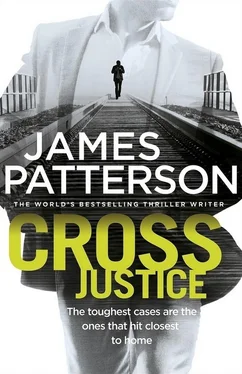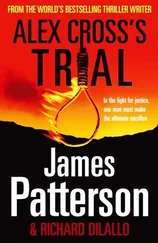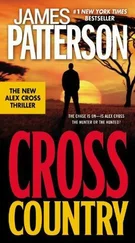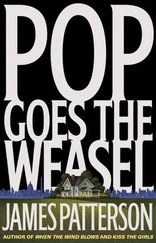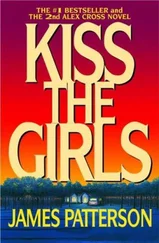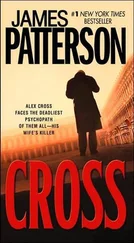“The school’s excellent. They’ll challenge her academically so she’s ready for wherever she decides to go to college,” he said.
Bree said, “How much is this going to cost us?”
“Zero,” the coach said.
“What?” I said. “How’s that possible?”
McDonald said he was funded by several athletic-shoe and-apparel companies and charged with finding and nurturing track talent. If Jannie became the kind of athlete he thought she was, she’d be in line for endorsements that would make her life easier in the long run.
Free education. A career as a professional athlete. Olympic—
“They’re heading home, Alex,” Bree said, breaking into my thoughts.
Nana Mama, Ali, and Jannie were in Pinkie’s pickup in front of us. Pinkie reached his massive four-finger hand out the window crossing the railroad tracks and waved to us.
I waved back as Bree put on the blinker and pulled into the old Piggly Wiggly parking lot. I folded the napkin, put it in my shirt pocket.
“Think she can do it?” Bree asked as we headed toward that line of trees on that short bluff above the tracks.
“I’m beginning to think she’s like you,” I said. “Capable of anything and everything.”
She smiled, poked me in the ribs, said, “When’d you get so sweet?”
“Day I met you.”
“Good answer.”
“I have my moments.”
When we reached the trees, Bree led me to a big beech tree that overlooked the tracks. There were steel steps screwed into the tree. She said bow hunters used them, and she’d bought them at the local army-navy.
She climbed up around ten feet to another recent purchase. The Bushnell night-vision trail camera was designed to take pictures of whatever came by. Hunters used them to pattern deer. There seemed to be a commercial for them every eight minutes on the Outdoor Channel.
“Even Jim Shockey uses them,” Bree said. “So I thought, Why not? We’ll take pictures of every train that comes through Starksville.”
Bree had put up this camera and another one three hundred yards west. She’d checked the memory cards once after twenty-four hours and found pictures of riders heading north on the train late Thursday afternoon, just about the time we’d seen riders the previous Thursday as we drove into town.
Now she traded memory cards on both cameras and reactivated them. We took the cards back to the rental car and looked at them on her computer. It took us a while to scroll through them, but we saw pictures of more riders taken the night before at ten, roughly the same time Bree saw Finn Davis giving that three-finger salute on Wednesday night.
Davis was not in any of the new photographs, but Bree’s patterns had been established. Riders at ten o’clock every other night. Riders at five on alternate afternoons.
It was half past four by then. Someone should ride by within the hour. Despite the heat, we decided to return to the trees to see if the pattern would hold. As we sweated and waited, bugs whined all around us, and I had the creepy feeling there were ticks crawling up my legs.
My phone rang. Naomi.
“Stefan’s been beaten again,” she said. “Some jail inmates got to him.”
I sighed, said, “It’s like that in every prison with child killers and abusers.”
“Except Stefan didn’t do it, Uncle Alex,” Naomi said forcefully.
“Right. Where is he?”
“In Starksville Memorial under guard,” she said.
The train signal at the crossing to our right a hundred yards ahead started to ring.
“I’ll try to stop by to—” I began before noticing a train coming slowly out of the south. Twenty cars back, I could make out a lone rider. “Got to go, Naomi.”
“Just one rider,” Bree said as I pocketed the phone.
“Better than none,” I said.
“How do you want to handle this?” she asked as the train engine groaned by at less than fifteen miles an hour.
“Get the car and parallel me heading north,” I said. “I’ll call you.”
“Where are you going?”
“On that train,” I said as the lone rider, a young white guy wearing a baseball cap, sunglasses, and a long black T-shirt, went past. He was sitting with his legs off the front of the freight car, looking straight ahead.
When I turned, Bree was already gone.
I waited until another fifteen cars had gone by before I left the trees, jumped off the bluff, and started to sprint.
Cutting at an angle to the train, I timed it so a steel ladder welded into one of the boxcars was coming right by me before I sped up one last time, stabbed out my hand, and caught one of the rungs at head height. Before it could jerk me off my feet, I jumped and got my shoes on the lowest rung.
I hung there for six or seven breaths, then the dinging of the train-crossing bell reminded me I was about to be seen by all the cars waiting on my side of the tracks. I clambered up.
Car horns honked as my boxcar passed through the crossing. I didn’t look over my shoulder and didn’t go up on top until we were well beyond it and the train was starting to pick up speed.
I peeked over the edge of the container car to check on the rider, make sure he was still looking forward, before I crawled up onto the roof. I laid flat, holding on to one of the flanges until I had enough breath and strength to get up. James Bond makes it look easy, but standing on top of a slow-moving train is tough. Stalking forward on a jolting, swaying, accelerating train takes superhuman balance that I do not possess. I couldn’t stand up straight at all and settled for a wide-footed crouch, taking one tentative step after another.
Jumping to the next car made me nauseated, but I did it and kept on, staring at the rooftop right in front of me, then the rider, then the track far beyond with the irrational fear that I was going to miss an oncoming tunnel and be swatted off the train.
It took a solid fifteen minutes to go eighteen cars forward. I was trying to be ninja-like when I jumped to the nineteenth car, the one right behind the container car upon which the rider was perched.
I must have made some kind of sound, or maybe it was just time for him to look around. When I landed, he was staring right at me.
He swung his right arm from his chest, revealing a pistol equipped with a sound suppressor. I threw myself flat just before he shot. The round pinged off the steel rooftop about two feet to my right.
The rocking of the train had thrown off his aim. Or he was a lousy shot. Or maybe a combination of the two. In any case, I dug down, came up with my little Ruger nine-millimeter just before he pulled the trigger again.
His bullet clanged off a flange six inches from my head. I shot at him and missed. But it was enough to change the dynamics of things. He wasn’t holding ground anymore. He was getting out of Dodge, jumping to the next car as I struggled to my feet.
He was leaping to an oval-shaped tanker car when I jumped onto the container car behind him. I landed fine but I didn’t see the rider anymore. Then I realized he’d slipped when he’d landed on the tanker and done a face-plant.
He was slow to move, dazed by the hit, and I was able to close much of the gap between us. When he finally regained his feet, I saw he was no longer carrying the suppressed pistol. Had he dropped it?
“Stop!” I yelled. “I just want to talk to you.”
But he kept moving forward.
“Stop, or I’ll shoot!”
He didn’t slow.
I aimed to his left, sent a bullet by his ear. That caused him to cringe and turn toward me with his hands up.
That’s better, I thought. Now we’re getting somewhere.
Ahead, I could see we were approaching a train trestle. I cautiously jumped to the tanker and got another ten feet closer to the rider. We were less than twenty feet apart. He crouched, holding on to a wheel on top of the tanker.
Читать дальше
